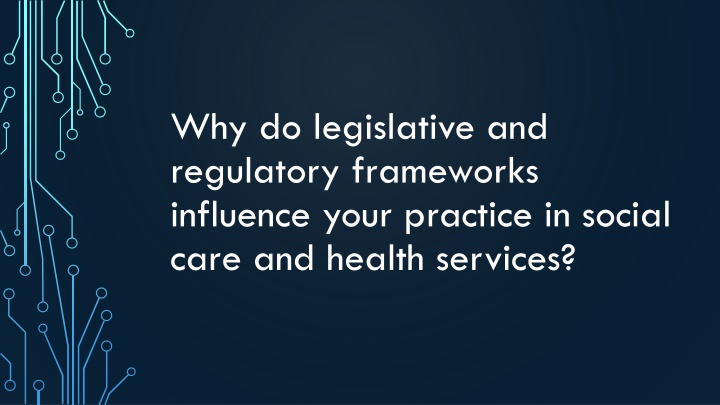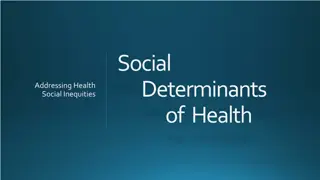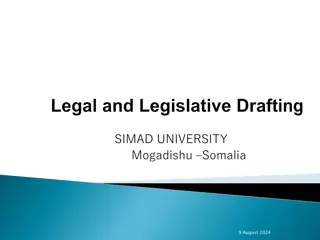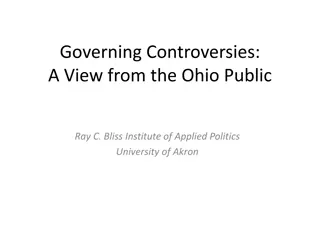Influence of Legislative and Regulatory Frameworks on Social Care and Health Services
Legislative and regulatory frameworks play a crucial role in shaping practices within social care and health services. From laws and legislation to codes of practice and statutory guidance, these frameworks establish guidelines that organizations must adhere to, ensuring quality care delivery and safeguarding service users. Understanding the impact of these frameworks is essential for professionals in the field to uphold standards and meet legal requirements effectively.
Download Presentation

Please find below an Image/Link to download the presentation.
The content on the website is provided AS IS for your information and personal use only. It may not be sold, licensed, or shared on other websites without obtaining consent from the author.If you encounter any issues during the download, it is possible that the publisher has removed the file from their server.
You are allowed to download the files provided on this website for personal or commercial use, subject to the condition that they are used lawfully. All files are the property of their respective owners.
The content on the website is provided AS IS for your information and personal use only. It may not be sold, licensed, or shared on other websites without obtaining consent from the author.
E N D
Presentation Transcript
Why do legislative and regulatory frameworks influence your practice in social care and health services?
Before we explore this question here are some definitions for terms that may be referred to in this presentation and module learning materials: Law - The enforceable body of rules that govern a society Legislation - The whole or part of a country s written law. In the UK and Wales, the term usually relates to Acts of Parliament or laws passed by devolved elected bodies (e.g. National Assembly for Wales) - The process of making written law Gooch and Williams (2015)
Some definitions: Act - Creation of a new law or changes to an existing law Legislative and regulatory frameworks - The process of monitoring and enforcing an Act (i.e. a law that has been passed by Parliament or the National Assembly for Wales) as well as a document or documents that contain the specific requirements relating to that Act Regulatory services in social care and health - Organisations with statutory (legal) responsibility for overseeing social care and health organisations implementation and adherence to legislative and regulatory frameworks, with the ability to take legal action if required, e.g. Care Inspectorate Wales (CIW) and Healthcare Inspectorate Wales (HIW) Gooch and Williams (2015) and Parliament.UK (2017)
Some definitions: Codes of Practice and Statutory Guidance - Provide guidance on how legislation should be implemented as an inherent part of regulation for example, see Codes of Practice and Statutory Guidance on the Social Services and Well-being (Wales) Act. These Codes can be accessed on the Social Care Wales website, e.g. Part 4 Code of Practice (Meeting Need) Fitness to practice - Ensuring that registered workers and employers have the skills, knowledge and character to work safely and effectively Social Care Wales has a regulatory function to ensure that this happens, including investigative powers and Fitness to Practice hearings. This means that a staff member can lose their right to practice in the social care profession. The Health and Care Professions Council (HCPC) are also a regulator who keep a register of health and care professionals who must meet their standards for training, professional skills, behaviour and health. Parallel to Social Care Wales, if a registrant (registered worker) does not meet the HCPC s standards they can take action which might include stopping a staff member from practicing
Set within the context of these definitions, we will return to the question: Why do legislative and regulatory frameworks influence your practice in social care and health services?
To answer this question it helps to: 1. Re-visit the theme on sociological theories where you gained an understanding of how individuals influence society and subsequently, how society influences individuals the same can be applied to legislative and regulatory frameworks 2. Conclude with thoughts on what happens if we do not have legislative and regulatory frameworks to influence your practice in social care and health services
We can think of the influence of individuals in society on legislative and regulatory frameworks and subsequently, the impact of these frameworks on the lives of individuals in the following way the next slides give a specific example Individuals in society Influence upon democracy, public consultation and political parties Legislative and regulatory frameworks Individuals in society
Recall your learning on sociological theories and individuals campaigns for the social model of disability let s see how this has influenced legislative and regulatory frameworks Individuals in society formed campaign and lobbying groups to call for society, including social care and health services to move from the medical to the social model of disability to promote equality and human rights for disabled people Watch Scope s film on the social model of disability: https://www.scope.org.uk/about-us/our-brand/social-model-of-disability These campaign and lobbying groups influenced democracy, public consultation and political parties Definition of democracy A political system where the public are responsible for their own government through individuals right to vote, recurrent free, competitive and fair elections, along with more than one political party and source of information. This is based on ideas of collective decision making, popular sovereignty (rule) and accountability. (Spicker, 2008; Morlino, 2010; Landman, 2013). In Wales, this democracy is presided over by the National Assembly for Wales which has law making powers in specified areas including social care and health. Definition of government policy Definition of political party A course or principle of action presented by the government relating to the lives of individuals in society. An organisation that intends to influence or direct government policy and is registered with the UK Electoral Commission (Electoral Commission, 2015). This is within the context of ongoing political tensions and negotiations between different political parties, campaign groups, lobbying organisations and society as a whole (Landman, 2013). In Wales, the Welsh Government is responsible for developing and implementing government policy based on Acts approved by the National Assembly for Wales and Parliament. (Welsh Government, 2017)
Campaign and lobbying groups influenced and continue to influence democracy, public consultations, political parties and the development of laws and policies intended to champion the rights, equality and independence of disabled people Some examples of laws and policies include: Prosecution for hate crime against a person because of their disability or perceived disability S146 (2) of the Criminal Justice Act 2003 Recognition that a disability can be mental (including mental illness) as well as physical requiring appropriate support from services Equality Act 2010 Mental Health (Wales) Measure 2010 Protection from discrimination because of a disability at work, in education, as a consumer, when using public services, when buying or renting property, as a member or guest of a private club or association Equality Act 2010
These laws and policies form an inherent part of legislative and regulatory frameworks that influence your practice in social care and health services For example: The Regulated Services (Service Providers and Responsible Individuals) (Wales) Regulations 2017 - PART 7 - Requirements on service providers as to the standard of care and support to be provided; Health and Care Standards Framework 2015 Theme on Effective Care - Standard 3.2 Communicating Effectively Criteria: Effective, accessible, appropriate and timely communication is tailored to the needs of each individual person and reasonable adjustments are made as defined in the Equality Act 2010 . Respect and sensitivity 25. (1) The service provider must ensure that individuals are treated with respect and sensitivity. (2) This includes, but is not limited to (d) having regard to any relevant protected characteristics (as defined in section 4 of the Equality Act 2010) of the individual. Section 47 of the Health and Social Care (Community Health and Standards) Act 2003 Regulation and Inspection of Social Care (Wales) Act 2016 Regulatory framework for health Regulatory framework for social care
So, in response to the question, why do legislative and regulatory frameworks influence your practice in social care and health services? A response can be: Fundamentally, it is individuals and groups in society (including those who have campaigned for equality and human rights) who have determined what is in legislative and regulatory frameworks. That includes you as a member of a democratic society. This is via their (and your) influence on democracy, public consultation from governments, political parties and the generation of laws relating to social care and health services. However, this is not a straightforward picture because there continues to be ongoing tensions and conflict within democracy. This means that what is included in legislative and regulatory frameworks will always reflect debate, conflict and some agreement across political parties. Outcomes for individuals Although political parties may differ in their opinions about the content of frameworks, there is general support for their purpose - to ensure that you provide services that involve high quality care and health support to enable individuals accessing and using services achieve their personal outcomes. This includes upholding individuals equality, safety and human rights.
Why do legislative and regulatory frameworks influence your practice in social care and health services? We will conclude with thoughts about what happens if we do not have legislative and regulatory frameworks to influence your practice in social care and health services: Think about your work on the theme of Introduction to safeguarding individuals and person centred practice the content of legislative and regulatory frameworks on safeguarding has been informed by survivors of abuse and wider evidence (e.g. research, public inquiries and Child Practice Reviews) to support effective safeguarding practices; legislative and regulatory frameworks play a vital role in safeguarding the safety and dignity of individuals accessing and using social care and health services. They also provide you with support to deliver safe and high quality services. Think about your work on the theme of Respect for uniqueness equality and diversity there continue to be significant inequalities between groups in society according to their protected characteristics (Equality Act 2010); legislative and regulatory frameworks provide a set of standards that all social care and health services should follow. This is to ensure that diverse individuals access and use services that are consistent in terms of being of high quality and responsive to their unique characteristics
In conclusion, we could argue that legislative and regulatory frameworks influence your practice in social care and health services because: They intend to improve services, having been informed by the experiences of individuals and groups (including those who have campaigned for equality and human rights) and other evidence to ensure that individuals, particularly those who are physically frail or vulnerable, receive the right care to promote their well-being and safety Legislative and regulatory frameworks provide you with a clear idea of what high quality, safe and responsive practice looks like, to support you to be effective in your role (including that of a future leader and manager) in social care and health services
References Gooch and Williams (2015) A dictionary of law enforcement. Second edition. Oxford: Oxford University Press. Oxford Scholarship Online [Online]. Available at: http://www.oxfordscholarship.com/ (Accessed: 19 November 2017). Landman, T. (2013) Human rights and democracy: the precarious triumph of ideals. Bloomsbury Collections: Bloomsbury Open 2013. DAOB Directory of Open Access Books [Online]. Available at: https://doabooks.org/ (Accessed: 19 November 2017). Morlino, L. (2010) Legitimacy and the quality of democracy , UNESCO, pp.211- 222. Wiley Online Library [Online]. Available at: http://onlinelibrary.wiley.com (Accessed: 19 November 2017). Parliament.UK (2017) About parliament. Available at: http://www.parliament.uk/ (Accessed: 19 November 2017). Social Care Wales (2017) Statutory guidance for service providers and responsible individuals on meeting service standard regulations: parts 3 to 19 of the regulated services (service providers and responsible individuals) regulations 2017. Spicker, P. (2012) Leadership: a perniciously vague concept , International Journal of Public Sector Management, 25 (1), pp.34-47. Emerald Group Publishing Limited [Online]. Available at: http://www.emeraldinsight.com (Accessed: 19 November 2017). The Electoral Commission (2015) The Electoral Commission. Available at: https://www.electoralcommission.org.uk/our- work/who-we-are (Accessed: 19 November 2017). The National Assembly for Wales (2017) About the Assembly. Available at: http://www.assembly.wales/en/abthome/Pages/abthome.aspx (Accessed: 19 November 2017). Welsh Government (2015) Health and Care Standards Framework. Available at: http://www.wales.nhs.uk/governance- emanual/health-and-care-standards (Accessed: 19 November 2017). Welsh Government (2017) Consultations. Available at: https://consultations.gov.wales/#faq1 (Accessed: 19 November 2017).























